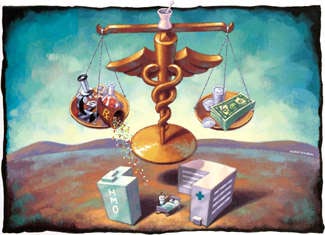 COLD FACTS
COLD FACTS
I want to take a minute to look at the legal drug industry. The prohibitionists make much of the fact that cannabis has not been tested and is not FDA approved as a medicine. As if the FDA has not become just another cog in the current corporate welfare machine we still pretend is a government for the people.
Pharmacueticals are a racket bigger than any illegal drug cartel. The drug companies get prominent doctors to sign off on bogus research that they fund themselves. This then paves the way for expedited FDA approval of virtually experimental drugs. The studies are ghostwritten by agencies working for the corporation and at least one doctor interviewed claimed he was unaware that a study was published under his credentials.
This story came to light in the UK when one of the writers suffered an attack of conscience.
Susanna Rees, an editorial assistant with a medical writing agency until 2002, was so concerned about what she witnessed that she posted a letter on the British Medical Journal website.
'Medical writing agencies go to great lengths to disguise the fact that the papers they ghostwrite and submit to journals and conferences are ghostwritten on behalf of pharmaceutical companies and not by the named authors,' she wrote.
Apparently it's a pervasive practice within the industry.
A medical writer who has worked for a number of agencies did not want to be identified for fear he would not get any work again.
'It is true that sometimes a drug company will pay a medical writer to write a review article supporting a particular drug,' he said. 'This will mean using all published information to write an article explaining the benefits of a particular treatment.
'A recognised doctor will then be found to put his or her name to it and it will be submitted to a journal without anybody knowing that a ghostwriter or a drug company is behind it. I agree this is probably unethical, but all the firms are at it.'
If the doctor balks at signing off on the 'research paper' the companies simply find someone else.
The article was a 12-page review paper ready to be presented at an forthcoming conference. [Dr. David] Healy's name appeared as the sole author, even though he had never seen a single word of it before. But he was unhappy with the glowing review of the drug in question, so he suggested some changes.
The company replied, saying he had missed some 'commercially important' points. In the end, the ghostwritten paper appeared at the conference and in a psychiatric journal in its original form - under another doctor's name.
The end result of this deception is that the consumer becomes an unwitting guinea pig for undertested pharmaceuticals and is exposed to unreported side effects.
Owing to fast-track FDA approval, manufacturers have promoted a number of inadequately tested drugs. The infamous diet drug Fen-Phen was recalled in 1997 after users sustained heart-valve damage. Trovan broke all antibiotic sales records in 1998, but the FDA issued a public health advisory that Trovan inflicted severe liver damage on some patients and was implicated in six deaths. Rezulin, a heavily-promoted diabetes drug that got fast-track approval in 1997, has been linked to over 215 reported deaths, but it was not taken off the market until March 21, 2000.
Just this week the popular diet aid, ephedra was pulled off the market after 155 deaths and dozens of heart attacks and strokes. It's as they say these days, all about the Benjamins. The profits in this industry are obscene and it costs the pharmas less to pay off the victims of these drugs than it does to conduct proper research that would ensure public safety. How do they get away with it? Can you say PAC money?
In 1998, drug companies earned $22 billion, chalking up a 5% greater profit margin than that of any other American industry. They had a little help from their friends, of course. The Congressional Research Service reported in 1999 that the drug industry paid 16.2% in taxes from 1993 to 1996, while all other major industries had an average tax rate of 27.3%. The drug industry was able to reduce its tax bill by approximately $3.8 billion in 1996 alone, owing to tax breaks for research and development granted by a Congress awash in drug company donations.
The National Institutes of Health donate research to the industry, which patents the information, although it is acquired at taxpayer expense. The FDA works hand in glove with the industry and too often grants its seal of approval to drugs that have not been subjected to independent testing.
To add insult to injury, US citizens are charged upwards to twice as much for these dangerous drugs than any other industrialized nation. So the next time you hear that an unprocessed plant is too dangerous to legalize because it's effects are untested, think about the people who have suffered injury and even death due to this corrupt 'safety system'.
Thousands of people die every year from overdosing on aspirin, much less the new drugs they promote with million dollar advertising blitzes. There has not been one reported death from an overdose of cannabis in 5000 years. Mark my words, if the pharmas could figure out a way to control the market, they would be the first ones on the drug policy reform bandwagon.

0 Comments:
Post a Comment
Subscribe to Post Comments [Atom]
<< Home